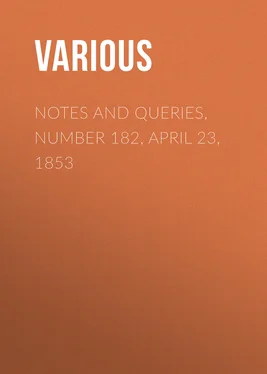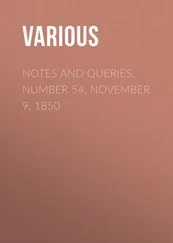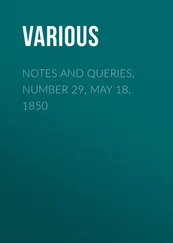Various - Notes and Queries, Number 182, April 23, 1853
Здесь есть возможность читать онлайн «Various - Notes and Queries, Number 182, April 23, 1853» — ознакомительный отрывок электронной книги совершенно бесплатно, а после прочтения отрывка купить полную версию. В некоторых случаях можно слушать аудио, скачать через торрент в формате fb2 и присутствует краткое содержание. Жанр: foreign_antique, periodic, foreign_edu, на английском языке. Описание произведения, (предисловие) а так же отзывы посетителей доступны на портале библиотеки ЛибКат.
- Название:Notes and Queries, Number 182, April 23, 1853
- Автор:
- Жанр:
- Год:неизвестен
- ISBN:нет данных
- Рейтинг книги:3 / 5. Голосов: 1
-
Избранное:Добавить в избранное
- Отзывы:
-
Ваша оценка:
- 60
- 1
- 2
- 3
- 4
- 5
Notes and Queries, Number 182, April 23, 1853: краткое содержание, описание и аннотация
Предлагаем к чтению аннотацию, описание, краткое содержание или предисловие (зависит от того, что написал сам автор книги «Notes and Queries, Number 182, April 23, 1853»). Если вы не нашли необходимую информацию о книге — напишите в комментариях, мы постараемся отыскать её.
Notes and Queries, Number 182, April 23, 1853 — читать онлайн ознакомительный отрывок
Ниже представлен текст книги, разбитый по страницам. Система сохранения места последней прочитанной страницы, позволяет с удобством читать онлайн бесплатно книгу «Notes and Queries, Number 182, April 23, 1853», без необходимости каждый раз заново искать на чём Вы остановились. Поставьте закладку, и сможете в любой момент перейти на страницу, на которой закончили чтение.
Интервал:
Закладка:
Musical. Milton.
Music-panting. Shelley.
New-abashed. 2 2 ( Troilus and Creseide ) imagines the nightingale to "stint" at the beginning of its song, and to be frightened at the least noise.
Chaucer.
Night-warbling. Milton, Milman.
Pale. Author of Raffaelle and Fornarina (1826).
Panting. Crashaw.
Passionate. Lady E. S. Wortley.
Pensive. Mrs. Charlotte Smith.
Piteous. Ambrose Philips.
Pity-pleading (used ironically). Coleridge.
Plaintive. Lord Lyttelton, Thomson, Keats, Hood.
Pleasant. An old but unknown author, quoted in Todd's Illustrations to Gower and Chaucer , p. 291., ed. 1810.
Poor. Shakspeare, Ford.
Rapt. Hon. Julian Fane (1852).
Ravished. Lilly.
Responsive. Darwin.
Restless. T. Lovell Beddoes (in The Bride's Tragedy , 1822).
Richly-toned. Southey.
Sad. Milton, Giles Fletcher, Drummond of Hawthornden, Graves, Darwin, Collins, Beattie, Byron, Mrs. Hemans, Mrs Fanny Kemble, Hood, T. L. Beddoes.
Shrill. Chaucer, Crashaw.
Silver-sounding. Richard Barnfield.
Single. 3 3 This, and the epithets of "sole-sitting" and "unseen," refer to the nightingale's love of solitary seclusion.
Southey.
Skilled. Ford.
Sleepless. 4 4 "He slep no more than doth the nightingale." Chaucer, Cant. Pil.
Atherstone.
Sober-suited. Thomson.
Soft. Milton, James I. Scot., Crashaw, Mrs. Charlotte Smith, Byron.
Solemn. Milton, Otway, Graingle.
Sole-sitting. Thomson.
Sorrowing. Shakspeare.
Soul-entrancing. Bishop Heber.
Supple. Crashaw.
Sweet. Chaucer, James I. Scot., Milton, Spenser, Crashaw, Drummond, Richard Barnfield, Ambrose Philips, Shelley, Cowper, Thomson, Young, Darwin, Lord Lyttelton, Mrs. Charlotte Smith, Moore, Coleridge, Wordsworth, L. E. L., Milman, Hood, Tennyson, P. J. Bailey, Kenny, Hon. J. Fane.
Sweetest. Milton, Browne, Thomson, Turnbull, Beattie.
Sweet-voiced. Wither.
Syren. Crashaw.
Tawny. Cary.
Tender. Crashaw, Turnbull.
Thrilling. Hon. Mrs. Wrottesley (1847).
Tuneful. Dyer, Grainger.
Unseen. Byron.
Vaunting. Bloomfield.
Voluptuous. Shelley.
Wakeful. Milton, Coleridge.
Wailing. Miss Landon.
Wandering. Mrs. Charlotte Smith, Hon. Mrs. Wrottesley.
Wanton. Coleridge.
Warbling. Milton, Ford, Chris. Smart, Pope, Smollett, Lord Lyttelton, Jos. Warton, Gray, Cowper.
Welcome. Wordsworth.
Wild. Moore, Tennyson, J. Westwood (1840).
Wise. Waller.
Wondrous . Mrs. Fanny Kemble.
In addition to these 109 epithets, others might be added of a fuller character; such as "Queen of all the quire" (Chaucer), "Night-music's king" (Richard Barnfield, 1549), "Angel of the spring" (Ben Jonson), " Music's best seed-plot " (Crashaw), "Best poet of the grove" (Thomson), "Sweet poet of the woods" (Mrs. Charlotte Smith), "Dryad of the trees" (Keats), "Sappho of the dell" (Hood); but the foregoing list of simple adjectives (which doubtless could be greatly increased by a more extended poetical reading) sufficiently demonstrates the popularity of the nightingale as a poetical embellishment, and would, perhaps, tend to prove that a greater diversity of epithets have been bestowed upon the nightingale than have been given to any other song-bird.
Cuthbert Bede, B.A.ON A PASSAGE IN OROSIUS
In King Alfred's version of Orosius, book ii. chap. iv. p. 68., Barrington, we have an account of an unsuccessful attempt made by one of Cyrus the Great's officers to swim across a river "mid twam tyncenum," with two tynkens . What was a tyncen ? That was the question nearly a hundred years ago, when Barrington was working out his translation; and the only answer to be found then was contained in the great dictionary published by Lye and Manning, but is not found now in Dr. Bosworth's second edition of his Dictionary: "Tynce, a tench ."
How the Persian nobleman was to be supported by two little fishes, which were more likely to land their passenger at the bottom of the river than on the opposite bank, we are left to guess. But, before we proceed with the experiment, let us see that we have got the fishes. That tench was in the Gyndis we have no authority for denying; but, if its Anglian or Saxon name was such as the dictionary exhibits, we have no trace of it in the text of Alfred; for under no form of declension, acknowledged in grammar, will tynce ever give tyncenum . We have no need, then, to spend time in calculating the chance of success, when we have not the means of making the experiment.
As either tync or tynce would give tyncum , not tyncenum , the latter must come out of tyncen (query, tynkin or tunkin , a little tun, a barrel, or a cask?). Such was the form in which the question presented itself to my mind, upon my first examination of the passage three or four years ago, but which was given up without sufficient investigation, owing to an impression that if such had been the meaning, it was so simple and obvious that nobody could have missed it.
An emergency, which I need not explain here, has within these few days recalled my attention to the subject; and I have no reason to be ashamed, or to make a secret, of the result.
Tyncen , the diminutive of tunne , is not only a genuine Anglo-Saxon word, but the type of a class, of whose existence in that language no Saxonist, I may say no Teutonist, not even the perspicacious and indefatigable Jacob Grimm himself, seems to be aware. The word is exactly analogous to Ger. tönnchen , from tonne , and proves three things:—1. That our ancestors formed diminutives in cen , as well as their neighbours in ken , kin , chen ; 2. That the radical vowel was modified: for y is the umlaut of u ; 3. That these properties of the dialect were known to Alfred the Great when he added this curious statement to the narrative of Orosius.
E. Thomson.NOTES ON SEVERAL MISUNDERSTOOD WORDS
Imperseverant , undiscerning. This word I have never met with but twice,—in Shakspeare's Cymbeline , with the sense above given; and in Bishop Andrewes' Sermon preached before Queen Elizabeth at Hampton Court, A.D. 1594, in the sense of unenduring:
"For the Sodomites are an example of impenitent wilful sinners; and Lot's wife of imperseverant and relapsing righteous persons."— Library of Ang.-Cath. Theology , vol. ii. p. 62.
Perseverant , discerning, and persevers , discerns, occur respectively at pp. 43. and 92. of Hawes's Pastime of Pleasure (Percy Society's edition). The noun substantive perseverance =discernment is as common a word as any of the like length in the English language. To omit the examples that might be cited out of Hawes's Pastime of Pleasure , I will adduce a dozen other instances; and if those should not be enough to justify my assertion, I will undertake to heap together two dozen more. Mr. Dyce, in his Critique of Knight and Collier's Shakspeare , rightly explains the meaning of the word in Cymbeline ; and quotes an example of perseverance from The Widow , to which the reader is referred. Mr. Dyce had, however, previously corrupted a passage in his edition of Rob. Greene's Dramatic Works , by substituting, "perceivance" for perseverance , the word in the original quarto of the Pinner of Wakefield , vol. ii. p. 184.:
Читать дальшеИнтервал:
Закладка:
Похожие книги на «Notes and Queries, Number 182, April 23, 1853»
Представляем Вашему вниманию похожие книги на «Notes and Queries, Number 182, April 23, 1853» списком для выбора. Мы отобрали схожую по названию и смыслу литературу в надежде предоставить читателям больше вариантов отыскать новые, интересные, ещё непрочитанные произведения.
Обсуждение, отзывы о книге «Notes and Queries, Number 182, April 23, 1853» и просто собственные мнения читателей. Оставьте ваши комментарии, напишите, что Вы думаете о произведении, его смысле или главных героях. Укажите что конкретно понравилось, а что нет, и почему Вы так считаете.












